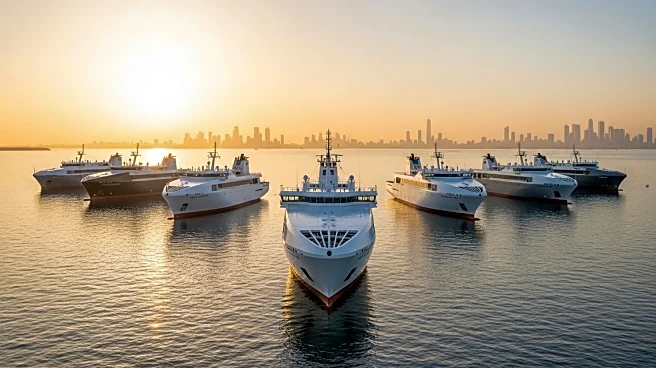What is the story about?
What's Happening?
The U.S. Trade Representative (USTR) has proposed a fee schedule targeting Chinese-owned, operated, or built vessels calling at U.S. ports, potentially costing the top 10 container carriers $3.2 billion in 2026. This initiative aims to reverse Chinese dominance in the shipping industry and restore American shipbuilding. The fees, set at $80 per net ton per voyage, will apply to vessels owned or operated by Chinese companies, with a maximum of five fees per year. China’s COSCO Group is expected to incur the highest fees, totaling $1.53 billion. Other carriers, such as Zim, Ocean Network Express (ONE), and CMA CGM, will also face significant fees due to their chartered vessels from Chinese owners.
Why It's Important?
The implementation of these fees could significantly impact the global shipping industry, particularly Chinese companies and those with vessels built in China. The fees are designed to encourage carriers to shift their vessel deployments and reduce reliance on Chinese-built ships. This move could lead to increased costs for carriers, potentially affecting shipping rates and global trade dynamics. The initiative reflects broader geopolitical tensions and efforts to bolster U.S. shipbuilding capabilities, potentially benefiting American shipbuilders and altering competitive dynamics in the industry.
What's Next?
Carriers are expected to adjust their strategies to mitigate the impact of the fees, including redeploying vessels and potentially shifting orders to non-Chinese shipyards. The USTR and U.S. Customs and Border Protection are anticipated to provide further guidance to the industry, with a deadline for implementation set for October 14. The industry is awaiting clarity on the payment mechanism and other aspects of the fee program, which could influence future shipping routes and vessel orders.
Beyond the Headlines
The fee program highlights the intersection of trade policy and national security concerns, as the U.S. seeks to reduce dependency on Chinese maritime infrastructure. This could lead to long-term shifts in global shipping patterns and investment in alternative shipbuilding regions, such as South Korea. The initiative may also prompt discussions on the environmental impact of shipping and the efficiency of larger vessels, as the World Shipping Council has raised concerns about the fee structure disproportionately penalizing larger ships.















